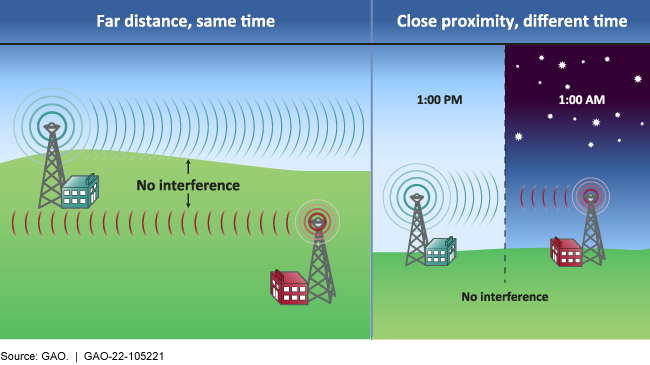Spectrum Management: Information Technologies for Managing Federal Use
Fast Facts
Radio frequency spectrum is a scarce resource vital to activities such as national defense and air traffic control. The National Telecommunications and Information Administration manages its allocation to federal agencies. But according to NTIA, out-of-date information technology hinders its efforts.
Federal officials said modernization of spectrum-related federal IT could provide benefits such as greater sharing of the limited spectrum and improved efficiency. For example, the current process for assigning spectrum relies on manual reviews of frequency requests and manual input of data. Automation could reduce errors and speed the process.
Potential Options for Avoiding Interference in Spectrum Sharing

Highlights
What GAO Found
Federal agencies use a variety of information technologies (IT) to manage their use of radio-frequency spectrum. The William M. (Mac) Thornberry National Defense Authorization Act for Fiscal Year 2021 (FY21 NDAA) required the National Telecommunications and Information Administration (NTIA) and covered agencies to develop plans to modernize their spectrum-related IT (i.e., the software, databases, and other tools that comprise their spectrum infrastructure).
Currently, the NTIA provides agencies with some spectrum-related IT systems, such as software, databases, and engineering tools, so that they can participate in NTIA's spectrum management processes. These processes include assigning frequencies for agencies to use and certifying spectrum-dependent equipment. GAO found that all 20 agencies covered by the FY21 NDAA modernization requirement rely at least in part on NTIA-provided IT to manage their spectrum use. Additionally, most of these agencies—DOD and the Federal Aviation Administration, in particular—augment NTIA-provided IT with additional spectrum-related IT that meets their unique mission needs.
Many of the officials GAO interviewed broadly agreed that modernizing spectrum-related IT could provide opportunities to improve spectrum management, mostly related to the following: (1) improving current spectrum management processes by addressing some limitations in existing spectrum-related IT and (2) facilitating the potential for greater spectrum sharing (i.e., enabling more than one spectrum user to use the same frequency band without interfering with each another). As NTIA and the covered agencies advance their modernization efforts in 2022, it is not yet clear if their plans will target these opportunities.
Why GAO Did This Study
Radio-frequency spectrum is a scarce natural resource vital to many commercial and government activities, including weather observation, air traffic control, and national defense. NTIA and government agencies have a responsibility to manage their spectrum use wisely. To do so, agencies rely on different spectrum-related IT, but NTIA has recently highlighted that existing IT is out-of-date and hinders spectrum management.
The FY21 NDAA contains a provision for GAO to review the current spectrum-related IT of covered agencies. This report describes (1) the existing spectrum-related IT that covered agencies employ to manage their spectrum use, and (2) the opportunities covered agencies and NTIA identified for improving spectrum management through IT modernization. The FY21 NDAA also contains a provision for GAO to conduct oversight of the implementation of agencies' spectrum-related IT modernization plans. This topic will be the subject of future GAO work.
For more information, contact Andrew Von Ah at (213) 830-1011 or vonaha@gao.gov.
